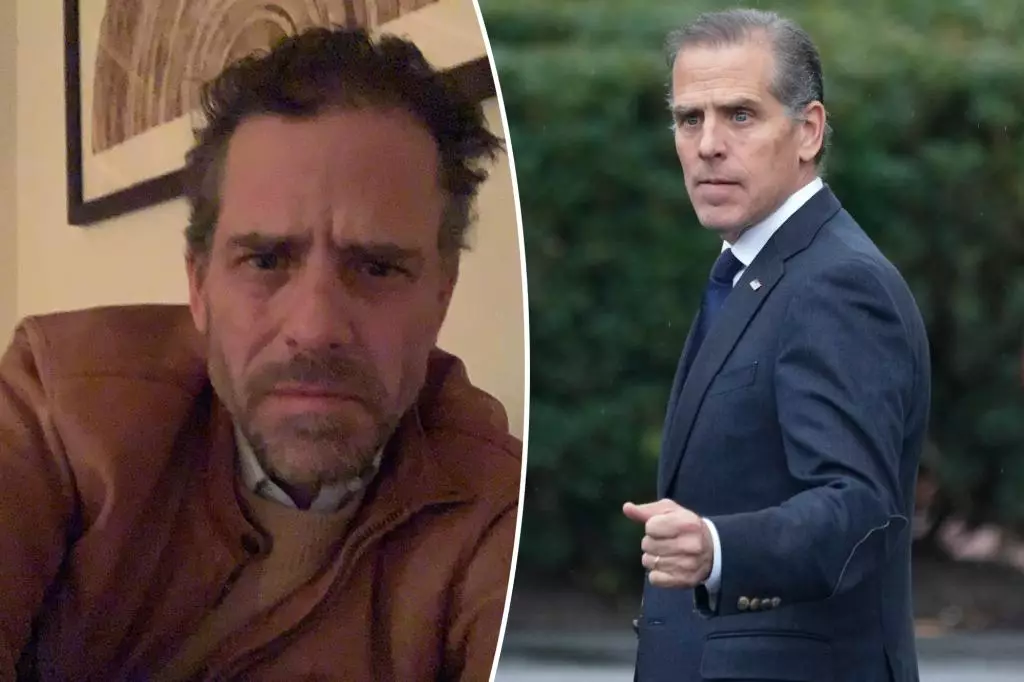In the tumultuous world of American politics, the name Hunter Biden has emerged as both a source of fascination and controversy, particularly as he navigates the duality of his life. Recently, Biden has attracted attention not just for his legal troubles, but also for his newfound popularity on the Hollywood party circuit. As he prepares for upcoming sentencing in connection with serious legal issues, including firearm possession and tax evasion, Hunter appears to be cultivating a social persona that stands in stark contrast to his looming courtroom battles.
Despite the significant legal and financial pressures Hunter Biden faces—reportedly an astonishing $18 million in legal fees—he seems to be garnering attention as an interesting guest among the elite of the entertainment industry. Reports from a recent gala in Los Angeles indicate that he was quite vocal about his tribulations, detailing his exorbitant legal bills and chronicling his connections to Ukraine. One insider noted how Hunter was effectively using the party atmosphere to contextualize his legal dilemmas, indicating that he was attempting to regain some control over his narrative amidst the swirling controversies that often engulf him.
Traditionally, one might expect a person facing serious legal ramifications to retreat into solitude or engage in self-reflection; however, Hunter’s approach illuminates his complicated relationship with fame and public perception. While his legal woes have often been characterized by accusations of privilege and entitlement, here he seems to leverage these social gatherings to shape how he is seen, transforming potential pity into intrigue. The juxtaposition is striking: a convicted felon mixing with Hollywood elites, captivating audiences not for his achievements but for the very scandals that plague him.
The Weight of Legal Troubles
Hunter Biden’s legal battles have been high-stakes affairs. Convicted on three counts of firearm possession while addicted to drugs, coupled with his guilty plea for tax evasion involving $1.4 million, the repercussions of these decisions loom large. Sentencing dates for both the gun and tax cases are rapidly approaching, and the outcomes could significantly impact his life moving forward. However, even when confronted with the potential consequences of his actions, the social engagements seem to take precedence, suggesting a complex psychological state where escapism and social status intersect.
His attorney’s silence on the matter further compounds the intrigue, hinting at a disconnect between Hunter’s legal team and his social pursuits. It raises questions about the effectiveness of his legal representation and their strategies amid such substantial public scrutiny. The reported backing from high-profile legal advisors suggests a safety net that may be dwindling; as learned from recent financial strains on his Hollywood benefactor, struggling to maintain momentum in a legal quagmire seems to take its toll.
The political landscape surrounding Hunter Biden adds another layer to his narrative. President Biden has publicly stated he would refrain from pardoning his son, a position that starkly contrasts with the unpredictable—and often contradictory—statements from former President Donald Trump. Trump’s willingness to entertain the idea of a pardon demonstrates the unpredictable dynamics of contemporary U.S. politics, where personal and partisan interests often blur. The prospect of a presidential pardon transforms Hunter’s pending sentencing into a political chess game, raising broader questions about justice, privilege, and redemption.
Trump’s commentary on Hunter also illustrates a shifting political calculus; once the enemy, Hunter may make for a useful pawn should he choose to serve the narrative of redemption. This idea not only feeds into Trump’s populist sentiments but also complicates the dynamics of how Biden operates as the father of a politically charged figure. As further developments unfold, Hunter Biden’s social life, legal challenges, and political ramifications will likely continue to intertwine, offering a compelling case study in modern American celebrity politics.
As Hunter Biden straddles the line between celebrity and legal accountability, the coming weeks will undoubtedly be pivotal for him. His rise as a popular fixture at Hollywood parties may offer a temporary reprieve from his realities. Still, the imperative for him is clear: the underlying legal troubles and public perceptions will not easily be forgotten. Only time will tell if he can truly separate himself from his infamous past or if he will remain ensnared in a cycle of legal and social entanglements that define his existence. As the dates for his sentencing loom, one has to wonder whether the mix of privilege, controversy, and charisma will save him or lead to further complications down the line.

